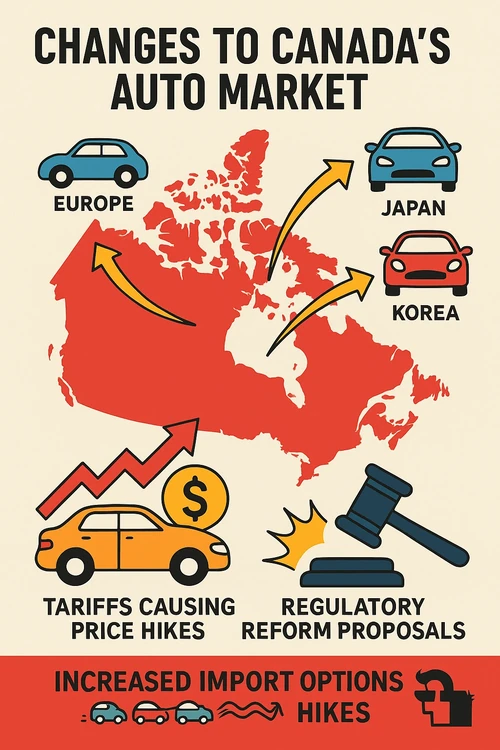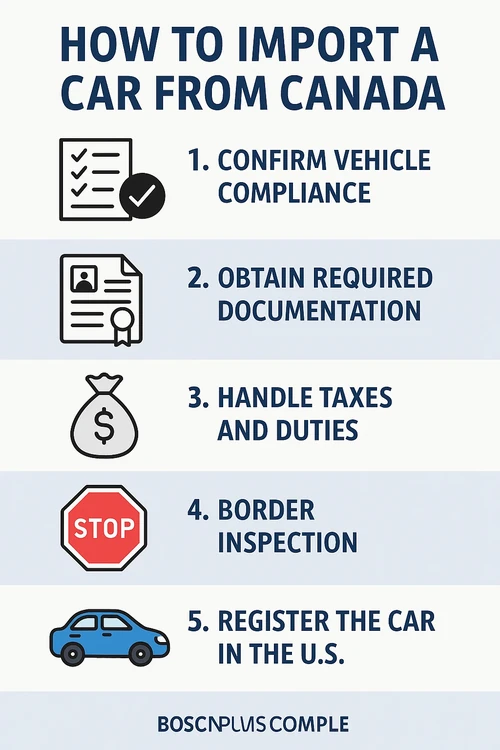Canadian auto dealers propose opening the market to more countries
April 28, 2025
Key takeaways
- Canadian auto dealers propose opening the market to more European, Japanese, and Korean cars
- Move could sidestep U.S. tariffs and reshape vehicle options for Canadian consumers
- CADA says regulatory reform would expand trade without retaliating against U.S. policies
Canada may soon have another reason to be annoyed with the U.S. Canadian car buyers may feel afinancial squeeze from U.S. trade policy, with Donald Trumps tariffs poised to raise the cost of new vehicles north of the border.
But the Canadian Automotive Dealers Association (CADA) has a solution: rewrite the rules to allow a broader array of global vehicles into Canada which couldupend the North American auto landscape.
CADA is urging Canada to break away from its traditional alignment with U.S. vehicle safety and environmental standards. Doing so would open the door to importing cars from Europe, Japan, and Korea, currently blocked due to regulatory differences.
Why Canada’s auto market is limited
At present, Canadas auto regulations are tightly synced with U.S. standards to streamline cross-border trade and production. But this tight coupling limits consumer choice.
This means that Canadians only get those vehicles and brands that Americans consider affordable and attractive, because Canadas [sales] volume alone doesnt justify the cost involved in making the vehicles compliant to North American standards, said Tim Reuss, president of CADA in a Carscoops report.
Opening Canada’s market to a wider range of cars, Reuss argues, would expand trade horizons, give consumers more choices, and leverage Canadas existing free trade agreements all without being seen as retaliation against the U.S.
Most manufacturers, even American ones, would likely support the move, according to Reuss.

Could Canada lead a shift?
Allowing imports from outside the U.S. could also put pressure on American regulators to reconsider their own standards. As Reuss pointed out: Do you really believe a vehicle that has been environmentally certified and deemed safe enough to be driven on a German autobahn is not safe enough to be driven in Canada?
If Canadian roads can handle these globally-approved vehicles, why not American roads too?
Other proposals on the table
In addition to opening up imports, CADA floated several other ideas to reduce the impact of tariffs, including:
-
Ending Canada’s electric vehicle (EV) mandates
-
Keeping big banks out of the vehicle leasing business
-
Scrapping the luxury vehicle tax
-
Refunding dealers who missed out on Canada’s recently exhausted iZEV EV incentive program
Exactly how Canadas federal government responds remains to be seen. But if even a few of these ideas gain traction, Canadians may not only avoid steep price hikes they could also gain greater access to a world of vehicles previously off-limits.
Effect on U.S. markets
There are a lot of pretty cool cars being made in Europe and elsewhere that are not sold in the U.S. or Canada, mostly because they don’t meet American safety and clean-air regulations.
Cars imported into Canada currently have to meet U.S. regulations but if Canada changes that, Canadians could soon be seeing small station wagons, exotic sports models and a variety of specialized vehicles not now seen anywhere in North America.
You can currently import Canadian cars into the U.S. without too much trouble, since Canada has aligned its standards with the U.S. But if that arrangement ends, as the Canadian dealers are suggesting, lots of new models could appear in Canada.
And no, you couldn’t import those cars into the U.S. legally. Car enthusiasts, however, would no doubt hunt out specialty shops known as Registered Importers, who could — for a price — modify the cars to meet U.S. standards.

Sign up below for The Daily Consumer, our newsletter on the latest consumer news, including recalls, scams, lawsuits and more.
.newsletter-form {
display: flex;
max-width: 400px;
margin: 20px auto;
background: #f8f9fa;
padding: 10px;
border-radius: 8px;
box-shadow: 0 4px 6px rgba(0, 0, 0, 0.1);
}
.newsletter-input {
flex: 1;
padding: 10px;
border: 1px solid #ccc;
border-radius: 5px 0 0 5px;
font-size: 16px;
outline: none;
}
.newsletter-input:focus {
border-color: #007bff;
}
.newsletter-button {
background: #2976D1;
color: white;
border: none;
padding: 10px 15px;
font-size: 16px;
border-radius: 0 5px 5px 0;
cursor: pointer;
transition: background 0.3s ease;
}
.newsletter-button:hover {
background: #0056b3;
}
#Trump #tariffs #raise #car #prices #Canada #increase #selection #cars #North #America